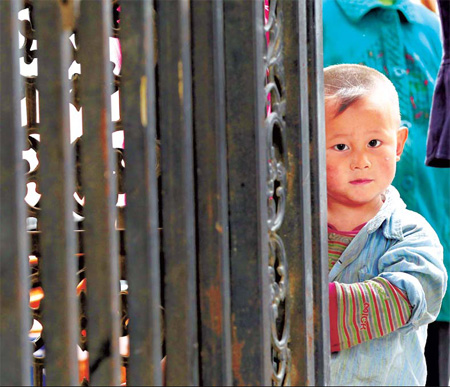Top Stories
Parents promoted as guards
By Ma Chao (China Daily)
Updated: 2010-05-25 07:57
 |
Large Medium Small |
|
A boy stands at the gate to his school. Parents have been called on to patrol the premises and boost security. WANG JING / CHINA DAILY |
Police move to recruit moms and dads to stand at gates
Parents across Beijing may soon be called on to provide security at the city's schools and kindergartens, according to the Beijing municipal public security bureau.
A string of attacks on children at schools and kindergartens in China since March has shocked the country and stimulated intensive measures by the government to safeguard schools and kindergartens. Police officers were sent to stand guard at schools and kindergartens, and more security staff have been enrolled to protect the campuses.
| ||||
"If we send a police officer to a school, there will not be not enough staff to handle other cases", he told METRO.
Geng sought to find a long-term solution and came up with the idea of mobilizing parents to assist with security. He sent an initial written proposal to the parents calling on them to "mount guard for a day".
"There are hundreds or even thousands of parents whose children study at a school. Therefore, if every parent stands guard in rotation, one may only need to stand a day or even less in a year," he said.
Teachers would join the vigilance groups too, ensuring each of the 18 schools and kindergartens had four to five people on guard. Geng said police officers would still patrol the area to guide and assist the vigilance groups.
Similar actions are being proposed in Shunyi district. School and kindergartens, cooperating with the local public security bureau, have started a campaign to mobilize parents to form a voluntary security force. Under the campaign called "joint parents' school protection", 713 parents have joined voluntary teams in the district until Saturday.
"The campaign has just began and is still in a early stage. When the vigilance team becomes better organized, more parents are expected to join", said Luo Yingli, the director in charge of campus security at the Renhe Central Primary School in Shunyi district.
At the Renhe school, volunteer parents stand in front of the gates in rotation in the mornings and evenings when pupils go into and leave schools and kindergartens.
The volunteers, wearing red armbands, are equipped with sticks, while professional security personnel are equipped with truncheons and chili spray.
"We plan to invite a security firm or local police officers to provide training for the parent volunteers," said Luo.
Vigilance groups in the Jinhaihu area of Pinggu district have been equipped with steel pitchforks and chili spray. Each school or kindergarten has been given four to five truncheons, too.
The Beijing police now intend to spread the model of parent volunteers to the whole city, and establish it as a long-term mechanism to provide security at schools and kindergartens.
"It is not the sole responsibility of the police to spread the practices. We need to cooperate with relevant departments, especially the education commission, to boost security at schools", said Zhao Feng, a police officer in charge of publicity with the Municipal Public Security Bureau.
There are differing opinions on the effectiveness of such volunteer groups. Luo believes the volunteer parents would be more conscientious in providing school security, as they are protecting their own children, and they are more empathetic to the safety of other children.
But many parents doubt the sustainability of the model. Wang Hui, a resident of Chaoyang district whose 13-year-old daughter studies at a local secondary school, said he would join the volunteer groups to protect the schools if the government called on him to do so. He doubted, however, whether this was an appropriate way to guarantee school security in the long run.
"Parents of the students are usually busy with their own jobs and hence have little spare time to stand guard for a long time. Grandparents of the students, with abundant free time, are too old and feeble to be proper guards," said Wang. "In the short run, the practice may be necessary. In the long haul, however, the government needs to find better solutions."


